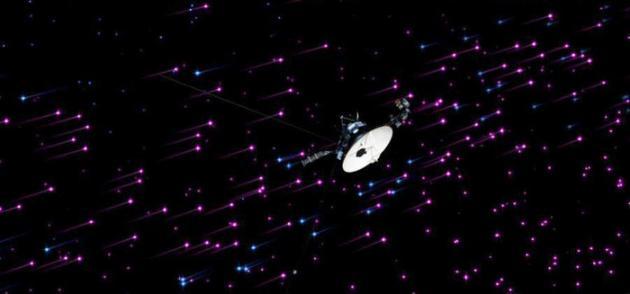 |
This still image shows NASA`s Voyager 1 spacecraft exploring a new region in our solar system called the "magnetic highway." (UPI) |
NASA says the Voyager 1 spacecraft has entered a region at the edge of the solar system, a final frontier it has to cross before reaching interstellar space.
Scientists have dubbed the region a “magnetic highway” where charged particles where our sun‘s magnetic field lines are connected to interstellar magnetic field lines, the space agency said.
The Voyager science team said it consider this region as still being inside our solar system because the direction of the magnetic field lines has not changed.
When Voyager breaks through to interstellar space, they said, these magnetic field lines are predicted to change.
“Although Voyager 1 still is inside the sun’s environment, we now can taste what it‘s like on the outside because the particles are zipping in and out on this magnetic highway,” said Edward Stone, Voyager project scientist based at the California Institute of Technology in Pasadena, Calif. “We believe this is the last leg of our journey to interstellar space.”
Voyager 1, launched in 1977, is now the most distant human-made object, about 11 billion miles away from the sun. (UPI)
<관련 한글 기사>
보이저 1호, 35년만에 태양계 끝까지 가
NASA가 보이저 1호(Voyager 1)가 태양계의 끝에 들어섰다고 전했다. 성간 공간에 진입하기 전의 마지막 관문인 셈이다.
과학자들은 태양의 자기장에서 대전(帶電)한 입자들이 성간 공간의 자기장과 연결되는 곳에 "자기장 고속도로"라는 이름을 붙였다.
보이저 팀은 이 지역을 태양계 내의 지역으로 보고 있다며 이는 이곳에서 자기장의 방향이 태양계와 다르지 않기 때문이라고 전했다.
보이저 호가 성간 공간으로 진입할 경우 자기장에 변화가 있을 것으로 추측된다.
"보이저 1호가 아직 태양의 영향력 아래 있지만 우리는 이제 태양 밖은 어떨지에 대해 짐작할 수 있습니다. 왜냐하면 자기장 고속도로의 입자들이 자기장을 열었다 닫았다 하거든요."라고 캘리포니아기술원(California Institute of Technology in Pasadena, Calif)에 기반을 둔 보이저 프로젝트 담당자 에드워드 스톤(Edward Stone)이 말했다. "지금이 성간공간으로 들어가기 위한 마지막 관문으로 보고 있습니다."
보이저 1호는 1977년 지구를 떠났고, 현재 태양에서 180억km 떨어져있다. 보이저 1호는 지구에서 가장 멀리 간 물체다. (코리아헤럴드)



![[Herald Interview] 'Korea, don't repeat Hong Kong's mistakes on foreign caregivers'](http://res.heraldm.com/phpwas/restmb_idxmake.php?idx=644&simg=/content/image/2024/11/13/20241113050481_0.jpg)
![[KH Explains] Why Yoon golfing is so controversial](http://res.heraldm.com/phpwas/restmb_idxmake.php?idx=644&simg=/content/image/2024/11/13/20241113050608_0.jpg)



